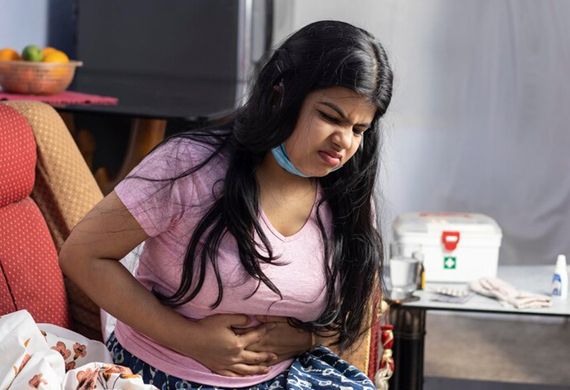
Attention Women: Excess Abdominal Fat Linked to Chronic Pain & Other Health Hazards
By: WE Staff
Indian women are increasingly suffering from health hazards due to excessive fat deposition, particularly visceral fat, which is exacerbated by sedentary lifestyles, unhealthy diets, and hormonal changes. According to a study from the UK Biobank datasheet, women with excess fat around their abdomen are twice as likely to experience chronic pain.
Excess abdominal fat or visceral fat, is a significant health concern for women in the recent time. This fat accumulates deep within the abdominal cavity, affecting vital organs like the liver, pancreas, and intestines. High levels of abdominal fat increase the risk of cardiovascular disease, insulin resistance, type 2 diabetes, and breast & colorectal cancer. Abdominal obesity also leads to chronic pain, reduced mobility, sleep, and mental health issues, as well as hormonal imbalances, affecting menstrual symptoms and affecting women's overall physical and emotional well-being.
The study of over 32,000 participants from the University of Tasmania, Australia, found that women with higher levels of 'subcutaneous adipose tissue' were at a 60 per cent increased chance of experiencing widespread chronic pain. The report states that stronger links between fat and chronic pain in women could be due to differences in fat distribution compared to men and hormonal differences.
The report mentioned, "Abdominal adipose tissue was associated with chronic musculoskeletal pain, suggesting that excessive and ectopic (abnormal) fat depositions may be involved in the pathogenesis of multisite and widespread chronic musculoskeletal pain."
What is Visceral Adipose Tissue (VAT)?
Global obesity rates, particularly among women, require targeted interventions addressing lifestyle, genetics, and gender-specific factors. Excess fat is harmful to health, but its location is crucial. About 90 per cent of body fat is subcutaneous, while 10 per cent is visceral or intra-abdominal. Visceral adipose tissue (VAT), a type of fat accumulated in the abdominal cavity, poses significant health risks for women. Visceral fat is found in organ spaces and the omentum, and while it makes up only a small proportion of body fat, it plays a significant role in various health issues. Excess VAT can lead to cardiovascular disease, type 2 diabetes, metabolic syndrome, and hormone-related cancers. It also causes chronic inflammation, fatigue, and hormonal imbalances.
Reducing VAT is essential for overall health and reducing the risk of serious conditions like heart disease, diabetes, and certain cancers. In order to achieve this, focus on whole foods, limit sugar and refined carbohydrates, increase protein intake, choose healthy fats, and engage in cardiovascular exercises, strength training, and high-intensity interval training (HIIT). Engaging in stress-reduction techniques, maintaining 7-9 hours of quality sleep, reducing alcohol intake, maintaining a healthy calorie deficit, and drinking enough water to regulate metabolism are essential. By incorporating these strategies, one can improve metabolic health and overall well-being.
Dr. Pal Manickam, Gastroenterologist & Holistic Health Advocate, and Co-Founder - NewMe in a podcast mentions about gut health and how does your daily routine and diet affect it. He says, “There are 3Fs that will make your gut happy - Fiber, Fermented Food, and Fasting.” In addition to this, he pointed out 'Stress' as the major risk factor that is causing a high number of heart attacks in women and youth in the present time. Dr. Pal says that while stressing about situations in a fast-paced time, our body releases Cortisol, a steroid hormone that affects several aspects of the body, and mainly helps to regulate your body's response to stress. Stress also leads to an increase in belly fat that can be measured through a simple step. He said, "Take a small inch tape, measure around your belly button, and if the waist circumference is more than 90cm in men and more than 80cm in women, it means you have more belly fat. And stress and diet are the main reason for your belly fat."
How to Manage Chronic Pain?
Chronic pain management involves a combination of lifestyle changes, medical treatments, and psychological support. Key strategies include medication, physical therapy, exercise, mindfulness, meditation, yoga, and cognitive behavioral therapy. Medical treatments include over-the-counter pain relievers, injections, nerve blocks, and physical therapy. Exercise and movement, such as walking, swimming, or yoga can improve circulation, strengthen muscles, and reduce pain.
In addition to these, diet and nutrition, including an anti-inflammatory diet and adequate hydration, can also help manage pain. Alternative therapies like acupuncture, chiropractic care, and massage therapy can also help, Heat and cold therapy can improve circulation and relax tight muscles. Prioritizing sleep and rest is crucial for pain management. Psychological and emotional support can be found through support groups and counseling. Pain management programs can be comprehensive, combining physical therapy, medication management, counseling, and alternative therapies. Lifestyle modifications, such as improving posture and workspace ergonomics, can also help manage stress. Overall, a holistic approach to chronic pain management involves a combination of these strategies to improve quality of life and pain control.


.jpg)



